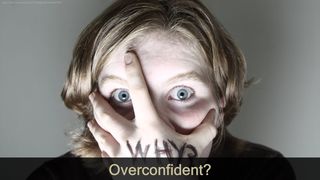Confidence
When You Have Too Much Confidence, Expect This to Happen
Positive self-beliefs are huge but not all the time, according to science.
Posted August 17, 2017 Reviewed by Jessica Schrader

Having confidence is indisputably a critical attribute for success. After accounting for ability, no other single quality is more influential on mediating performance outcomes than the positive expectation to accomplish desired results (Bandura, 1997). But is having too much confidence a problem? According to science, yes, it is.
Some common examples of being overly confident include arriving late for an appointment because you underestimated your travel time, or because you overestimated your driving abilities. Perhaps you are like some people who think they can complete a project quickly, only to wind up missing deadlines, because you ran out of time due to exaggerated optimism. Frequently, overconfidence results in minimal exertion during work under the false belief that a task is easy or can be quickly completed. These common consequences of overconfidence may be damaging to your ego and possibly your reputation, but can be improved with good planning skills and time management strategies. However, it’s not always that simple.

Overconfidence can have more devastating implications, too. Just remember what happened after General Custer yelled “charge” at the Battle of Big Horn before his troops were massacred, or recall the misinformed ship captain who proclaimed, “It’s only a little ice,” after hitting an iceberg that sank the unsinkable Titanic. As we can see, overconfidence can have tragic consequences. Since you likely won’t be engaged in tribal battles or piloting a 1912 cruise ship, instead let’s examine some other practical ramifications of our inflated confidence beliefs.
Each one of us has personal theories about the way the world works. You may have a view about the importance of prayer, or have opinions about how humans should treat the environment. You even have beliefs about the proper way to cook an egg. For example, have you ever been on a road trip, traveling down the lonesome highway when someone zooms past you at 80 miles per hour? How did you react? If you are like some people, you probably have a pet name for that person that sped past you, something unflattering, such as idiot or moron. How about when you are cruising along in the left lane, jamming to your favorite Justin Bieber tune, only to get stuck behind someone driving the speed limit—much slower than you. You probably have a derogatory name for that person, too. So, it seems that both faster or slower drivers than you have the potential to provoke negative reactions. In other words, only your speed is the “right” speed, regardless of how fast you drive.
How do preferences relate to confidence?

We usually believe that our opinions, values, and worldviews are justified and appropriate compared to other people, and we are generally pretty darn confident about our perspectives. The average person is quite comfortable with not only their way of driving, but their way of parenting, dressing, speaking, and yes, even their level of motivation and effort devoted to a task. During one of my recent courses on motivation, I asked my students to compare their motivation for learning and performance to a highly motivated fictional character. Twenty-six out of 27 students proclaimed their motives were superior and more appropriate than the character! Yes, it boils down to the general impression that we believe our way is the best way, which in turn impacts our confidence because we are positively biased about our own skills and abilities.
There are plenty of expressions and terms to describe the psychological phenomena of personal bias that accounts for our preferential thinking. Adjectives such as egotistical and narcissistic quickly come to mind. Motivational scientists call the process of being overly confident about our personal perspectives and demonstrating myopic thinking patterns as demonstrating myside bias. The phenomena occur “when people evaluate evidence, generate evidence, and test hypotheses in a manner biased toward their own prior opinions and attitudes.” (Stanovich, West, & Toplak, 2013, p. 213). Consequences of myside bias predispose us to believe that our “way” is superior. At best, myside bias usually means not being able to see the potential drawbacks of your own personal beliefs and perspectives. In the worst case, bias results in poor decisions because we only seek out evidence that confirms our pre-existing beliefs, clouding our analytical skills and interfering with our ability to solve problems correctly.
Taming the preferential beast

The problem is clearly identified, but how is myside bias and over-confidence best contained? First, I recommend strict adherence to the 'Reality Hack' that I discuss in the book Hack Your Motivation: Over 50-Science-Based Strategies to Improve Performance. The Reality Hack contends that things will occasionally go wrong no matter how hard we try to avoid difficulty. Escaping delays, misfortune, sadness, rejection, and stress indefinitely is unrealistic. The hack also contends that a realistic approach to life means that you will not always be correct despite your advanced skills, knowledge, ability, and experience.
The next step to contain biased and potentially flawed thinking is by closely monitoring and reflecting upon our overall thinking process. Instead of making snap conclusions, we should wait and think about our thinking, reflecting on the consequences of potential action. Third, we should critically examine the evidence-gathering process, asking ourselves if we have evaluated all available evidence, or only information that supports our position. A final step is an openness to alternative conceptions and consideration of opinions that may refute our existing beliefs.
In the end, forestalling overconfidence and myside bias requires accurately calibrating your own abilities, while honestly evaluating task requirements. If we are uncertain about what it takes to complete a task, we should be more conservative in our projections. Similarly, proper calibration of ability must be demonstrated even when we believe we know a task inside and out. Over-calibrating ability may result in exerting limited effort because we think a task is easy. Under-calibrating task requirements may result in stress and performance anxiety once we get a clearer picture of what skills are needed to successfully complete the task. Anxiety, in turn, zaps precious cognitive resources otherwise devoted to task requirements. As with most motivational factors, the greater your overall self-awareness, the higher the probability you will be able to overcome the psychological traps described. Realistic and vigilant assessments will ultimately benefit your calibration accuracy and avoid the negative effects of myside bias.
For free information, daily updates, and original content on motivation, leadership, learning, and peak performance, follow me on Twitter @ifoundmo.
References
Bandura, A. (1997). Self-efficacy: The exercise of control. New York, NY: W.H. Freeman.
Stanovich, K. E., West, R. F., & Toplak, M. E. (2013). Myside bias, rational thinking, and intelligence. Current Directions in Psychological Science, 22(4), 259-264.




